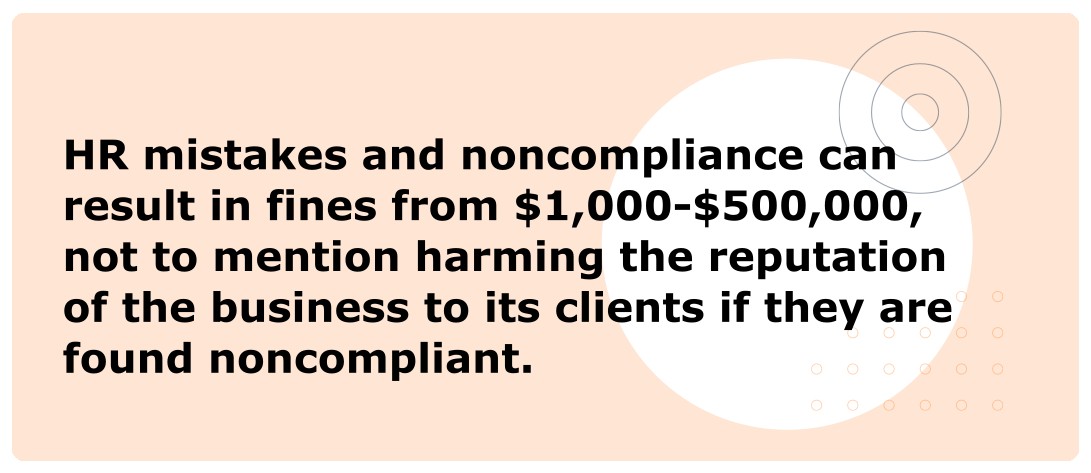
An internal human resource audit helps evaluate HR functions of your business to identify potential problems or areas of concern. Audits of any kind can make business owners and department heads uncomfortable. The purpose is to discover gaps in your process, which can create vulnerabilities. Audits also give executives and business owners an understanding if their HR department is in line with business strategy and goals. An external HR audit can have a big impact on your business if problems are discovered. HR mistakes and noncompliance can result in fines from $1,000-$500,000, not to mention harming the reputation of the business to its clients if they are found noncompliant. This is one of the main reasons businesses hire HR outsourcing providers. These partners conduct internal HR audits to catch errors, noncompliance, or reoccurring mistakes before these oversights are accompanied by the weight of heavy fines. Internal audits are sometimes difficult as they lack a third party perspective to understand whether the company is operating with best practices or in compliance. After all, if the internal team knew there was a better way, it’s likely they would have already identified the gap. A third party auditor can often bring a depth of knowledge surrounding compliance and best practices to help a company understand its gaps in relation to the broader market.

So what do you need to know prior to an HR audit? Here will discuss what’s included in an audit, the process of an audit, and what takeaway information you can use to improve HR functions moving forward.
What Should an HR Audit Include?
Creating a checklist will help the HR department prepare for an audit and ensure all areas have been covered. You can create a checklist on your own that includes areas of concern, but there are a few required components you should be sure to cover. An HR compliance checklist should include the following:
- Regulatory and Compliance – Do you have the forms, postings, and data needed to remain in compliance and is this data stored correctly in accordance with the latest laws?
- Talent Acquisition – What is it like to go through your talent pipeline as a candidate? Are there places to improve the experience? Is your talent pipeline meeting the demands of the business?
- Total Rewards – What is your compensation strategy and is it meeting the demands of the business? Are your benefit and total rewards programs leveraged by employees and incentivizing the correct behaviors?
- Talent Management – Does your talent performance and recognition system meet company goals and is it a reflection of company values?
- HR Infrastructure – Do your HR systems make it easy to execute on your HR goals? Do you have a dashboard tool that drives accountability through the HR organization?
What are the Prerequisites for an HR Audit?
Conducting an HR audit is a crucial step in ensuring that your human resources department operates effectively and in compliance with relevant regulations. Prior to undertaking an HR audit, there are several key prerequisites that business owners and executives must consider to facilitate a seamless and comprehensive evaluation process.
Preparation and Documentation
One of the first steps in preparing for an HR audit is to gather all necessary documentation. This includes, but is not limited to, employee records, payroll information, compliance documents, and benefits data. Ensuring that these documents are accurate, complete, and readily accessible is fundamental. It is advisable to conduct an internal review of these documents to identify any apparent discrepancies or areas that may require further scrutiny.
Clear Audit Scope and Objectives
Defining the scope and objectives of the audit is paramount. Determine whether the audit will focus on compliance, strategic HR alignment, or both. Having a clear understanding of what you aim to achieve with the audit will help tailor the process and questions to address specific areas of interest. This clarity will also help delineate responsibilities among the audit team and ensure that all pertinent areas are covered.
Audit Team and Training
Selecting a competent audit team is essential. This team should comprise individuals with a deep understanding of HR processes and compliance requirements. Additionally, the team members should undergo training to familiarize themselves with the audit objectives, tools, and techniques. This preparation will enable them to conduct a thorough and unbiased review of the HR functions.
Internal Communication
Effective communication with employees about the upcoming audit is also crucial. Informing staff about the purpose and process of the audit will alleviate concerns and encourage cooperation. Transparency regarding the audit fosters an environment of trust and ensures that employees are supportive and willing to provide the necessary information and insights.
Technology and Tools
Leveraging technology can significantly enhance the efficiency and accuracy of an HR audit. Utilize advanced HR software and tools to collect, analyze, and interpret data. These tools can help automate some aspects of the audit, reducing manual effort and the likelihood of human error.
Compliance and Regulatory Awareness
Stay informed about the latest regulatory changes and compliance requirements. An understanding of current employment laws and standards is necessary to evaluate your HR practices against these benchmarks. Noncompliance can lead to significant financial penalties and damage your company’s reputation, making this a critical prerequisite.
What is the Process of an HR Audit?
HR audits can vary, but there are several key steps that most audits include, described below.
- Define the scope of the audit
Decide what areas of HR your audit will cover. Determine if you will conduct a compliance audit or an HR strategy audit. This will determine the types of questions you ask and the information you are evaluating.
- Create an audit questionnaire
Questions should most often be posed in a yes/no format. These will help you evaluate preparedness by asking about specifics regarding personnel files, payroll, compensation and benefits, recruitment, talent acquisition and turnover, and performance and productivity.
- Collect the data
Audit team members will use the questionnaire as a guide to conduct the audit and investigate. It’s important team members understand the function and process of the audit.
- Provide feedback about the results
The information gathered from the audit should be summarized in a rubric and delivered to HR professionals and senior-level management. This is often communicated through a written report so it can be shared and referred to in the following weeks and months—especially as corrective actions are taken.
- Develop action plans
Create a list of corrective steps to take for items of concern discovered during the audit. Otherwise, the audit serves no purpose.
Accountability and expertise are the main benefits of having an HR outsourcing provider conduct the HR audit. You need a partner who knows the process inside and out and who can provide unbiased review. A great outsourcing partner will also bring the latest best practice and compliance practices into the audit process.
At Milestone, we understand the importance of accountability when it comes to compliance issues and your human resources department. We’re flexible in helping you conduct internal HR audits, whether that means working with your current internal human resources professional for additional support, or if you want us to conduct the entire process ourselves.
If you are ready to overhaul your HR functions, contact us today!
Related Content

Startup Employee Benefits – Compensation and Health Benefits for Startup Companies
At its core, your startup or small business should include the following benefits: Health Insurance (vision and dental), paid time ...

How To Pay Employees in a Startup
At a fundamental level, HR management includes any tasks that help optimize your most valuable resource—your people!

What Are the 4 Fundamentals of HR?
At a fundamental level, HR management includes any tasks that help optimize your most valuable resource—your people!
Stay in the know